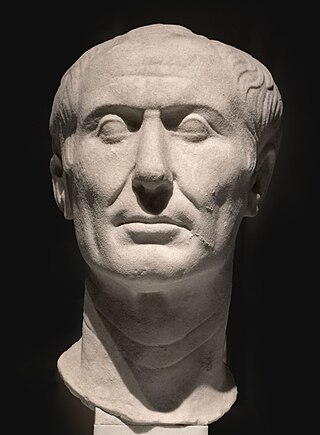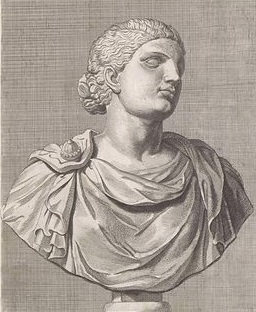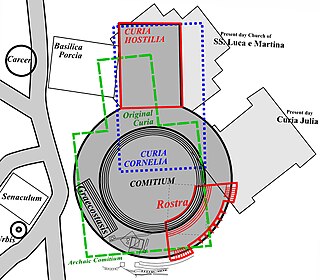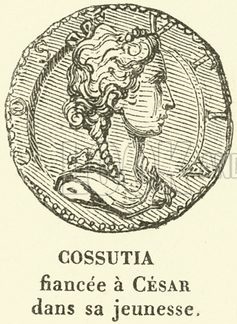
Gaius Julius Caesar was a Roman general and statesman. A member of the First Triumvirate, Caesar led the Roman armies in the Gallic Wars before defeating his political rival Pompey in a civil war, and subsequently became dictator from 49 BC until his assassination in 44 BC. He played a critical role in the events that led to the demise of the Roman Republic and the rise of the Roman Empire.
Publius Clodius Pulcher was a populist Roman politician and street agitator during the time of the First Triumvirate. One of the most colourful personalities of his era, Clodius was descended from the aristocratic Claudia gens, one of Rome's oldest and noblest patrician families, but he contrived to be adopted by an obscure plebeian, so that he could be elected tribune of the plebs. During his term of office, he pushed through an ambitious legislative program, including a grain dole; but he is chiefly remembered for his long-running feuds with political opponents, particularly Cicero, whose writings offer antagonistic, detailed accounts and allegations concerning Clodius' political activities and scandalous lifestyle. Clodius was tried for the capital offence of sacrilege, following his intrusion on the women-only rites of the goddess Bona Dea, purportedly with the intention of seducing Caesar's wife Pompeia; his feud with Cicero led to Cicero's temporary exile; his feud with Milo ended in his own death at the hands of Milo's bodyguards.

The gens Claudia, sometimes written Clodia, was one of the most prominent patrician houses at ancient Rome. The gens traced its origin to the earliest days of the Roman Republic. The first of the Claudii to obtain the consulship was Appius Claudius Sabinus Regillensis, in 495 BC, and from that time its members frequently held the highest offices of the state, both under the Republic and in imperial times.
Mucia Tertia was a Roman matrona who lived in the 1st century BC. She was the daughter of Quintus Mucius Scaevola, the pontifex maximus and consul in 95 BC.

The gens Pompeia was a plebeian family at ancient Rome, first appearing in history during the second century BC, and frequently occupying the highest offices of the Roman state from then until imperial times. The first of the Pompeii to obtain the consulship was Quintus Pompeius in 141 BC, but by far the most illustrious of the gens was Gnaeus Pompeius, surnamed Magnus, a distinguished general under the dictator Sulla, who became a member of the First Triumvirate, together with Caesar and Crassus. After the death of Crassus, the rivalry between Caesar and Pompeius led to the Civil War, one of the defining events of the final years of the Roman Republic.
Faustus Cornelius Sulla was a politician of the Roman Republic. He was the son of the dictator Lucius Cornelius Sulla. He started his career in the shadow of Pompey, whom he followed during the Civil War against Julius Caesar. He was killed soon after the battle of Thapsus in 46 BC.

The gens Cornelia was one of the greatest patrician houses at ancient Rome. For more than seven hundred years, from the early decades of the Republic to the third century AD, the Cornelii produced more eminent statesmen and generals than any other gens. At least seventy-five consuls under the Republic were members of this family, beginning with Servius Cornelius Maluginensis in 485 BC. Together with the Aemilii, Claudii, Fabii, Manlii, and Valerii, the Cornelii were almost certainly numbered among the gentes maiores, the most important and powerful families of Rome, who for centuries dominated the Republican magistracies. All of the major branches of the Cornelian gens were patrician, but there were also plebeian Cornelii, at least some of whom were descended from freedmen.

Aurelia was the mother of the Roman general and statesman Julius Caesar.

Calpurnia was either the third or fourth wife of Julius Caesar, and the one to whom he was married at the time of his assassination. According to contemporary sources, she was a good and faithful wife, in spite of her husband's infidelity; and, forewarned of the attempt on his life, she endeavored in vain to prevent his murder.

Julia was the daughter of Roman dictator Julius Caesar and his first or second wife Cornelia, and his only child from his marriages. Julia became the fourth wife of Pompey the Great and was renowned for her beauty and virtue.

Julia Minor was the second of two daughters of Gaius Julius Caesar and Aurelia. She was an elder sister of the dictator Julius Caesar, and the maternal grandmother of Rome's first emperor Augustus.

Cornelia was the first or second wife of Julius Caesar, and the mother of his only legitimate child, Julia. A daughter of Lucius Cornelius Cinna, Cornelia was related by birth or marriage to many of the most influential figures of the late Republic.

The Ides of March is an epistolary novel by Thornton Wilder that was published in 1948. It is, in the author's words, 'a fantasia on certain events and persons of the last days of the Roman republic. Historical reconstruction is not among the primary aims of this work'. The novel deals with the characters and events leading to, and culminating in, the assassination of Julius Caesar.
Quintus Pompeius was the name of various Romans from the gens Pompeia, who were of plebeian status. They lived during the Roman Republic and Roman Empire.

The Curia Cornelia was a place where the Roman Senate assembled beginning c. 52 BC. It was the largest of all the Curiae built in Rome. Its construction took over a great deal of the traditional comitium space and brought the senate building into a commanding location within the Roman Forum as a whole. It was the Senate House of the time of Julius Caesar and is significant because its location was moved by him to diminish the Senate's dominance within the City and Republic.

Cossutia was a Roman woman who became engaged to Julius Caesar prior to his reaching adulthood. There has been debate among historians on whether the marriage actually occurred.
The career of Julius Caesar before his consulship in 59 BC was characterized by military adventurism and political persecution. Julius Caesar was born on 12 July 100 BC into a patrician family, the gens Julia, which claimed descent from Iulus, son of the legendary Trojan prince Aeneas, supposedly the son of the goddess Venus. His father died when he was just 16, leaving Caesar as the head of the household. His family status put him at odds with the Dictator Lucius Cornelius Sulla, who almost had him executed.

The military campaigns of Julius Caesar were a series of wars that reshaped the political landscape of the Roman Republic, expanded its territories, and ultimately paved the way for the transition from republic to empire. The wars constituted both the Gallic Wars and Caesar's civil war.
Julia, also known as Julia Major and Julia the Elder, was the elder sister of Julius Caesar, the Roman dictator.

The first-century-BCE Roman statesman and commander Pompey the Great was married five times. These marriages were not only romantic matches, but political arrangements, often dictated by Pompey's political career and need to form alliances with other powerful Roman men.












